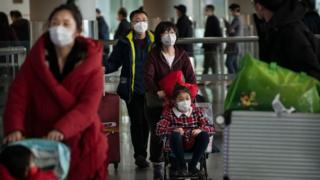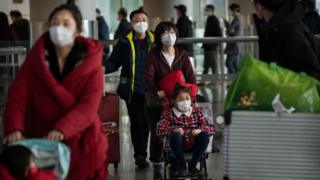Coronavirus: Britons in Wuhan to fly home on Friday
A flight carrying 150 UK and 50 EU nationals will leave the coronavirus-stricken city later on Thursday. …

 Image copyright Getty Images
Image copyright Getty Images British nationals trapped in Wuhan will return home on Friday, Foreign Secretary Dominic Raab has said.
The evacuation flight, thought to be carrying 150 Britons and 50 people from elsewhere in the EU, will leave at 07:00 local time (23:00 GMT Thursday).
The UK nationals will fly to RAF Brize Norton before the other passengers – most thought to be Spanish – will be flown on to another EU airport.
The virus has caused 170 deaths and spread to 15 other countries.
So far, 7,700 cases of the virus have been confirmed in China.
As of Wednesday, 161 tests have been carried out on people across the UK – all with negative results.
‘Supported isolation’
Passengers flying from Wuhan, the centre of the coronavirus outbreak, will be checked by Chinese officials at a handling centre in the airport, then taken to its departure area where British officials will do more health tests.
Anyone who is unwell will not be allowed to board the flight, which will have a team of Ministry of Defence medics on board.
When passengers arrive at Brize Norton, Oxfordshire, they will be transported to former NHS staff accommodation in the north-west of England.
They will be put in “supported isolation” for 14 days with “all necessary medical attention”, a Downing Street spokesman said.
The flight had been due to leave Wuhan earlier but was delayed because of a lack of clearance.
In a statement, Mr Raab said: “The safety and security of British nationals is our top priority.
“Our embassy in Beijing and consular teams remain in close contact with British nationals in the region to ensure they have the latest information they need.”
In other developments:
- Downing Street said it was pressing Beijing to allow spouses or partners of UK nationals to be on the Wuhan flight
- Scotland’s chief medical officer said a case of coronavirus was “highly likely” to be detected in the country in the coming days
- The World Health Organization is to decide later whether to declare an international public health emergency
- British Airways has extended its cancellation of services to mainland China until 29 February. Virgin Atlantic flights between Heathrow and Shanghai are continuing to operate as scheduled
Britons have told of family members with Chinese citizenship being not being permitted to travel by local authorities.
Matt Raw, who lives in Wuhan with his mother, who has Alzheimer’s disease, and his wife – who helps care for her – told the BBC’s Victoria Derbyshire programme his spouse had been prevented from flying so the whole family was staying.
He said they were also concerned about the risks of flying, having seen reports that three Japanese people on evacuation flights were found to have the virus.
Adam Bridgeman said he would stay in Wuhan if his wife and one-month-old son were not allowed to fly with him.
He told BBC Radio 4’s Today programme that remaining in Wuhan with a newborn was “a tough situation” as they were “not willing to take the risk” of bringing him to hospital for routine treatment such as vaccinations.
Hundreds of foreign nationals are being evacuated from Wuhan, with Japan, the US and the EU among those repatriating their citizens.

Media playback is unsupported on your device
How deadly is coronavirus?
It is a basic question, but the answer is elusive.
It is far too simplistic to take the 170 deaths and the 7,711 cases and come up with a death rate of 2%.
We are in the middle of the outbreak and thousands of those patients are still being treated. We don’t know if they will live or die, so they can’t be used in these calculations.
We also don’t know how many mild and undetected cases are out there.
Also, the deadliness of the new virus is only one component of its threat.
Flu kills hundreds of thousands of people each year, not because it is super-deadly, but because it is able to infect so many people.
Learn more about the new virus

Media playback is unsupported on your device
Have you been affected by any of the issues raised? You can share your experience by emailing haveyoursay@bbc.co.uk.
Please include a contact number if you are willing to speak to a BBC journalist. You can also contact us in the following ways:




